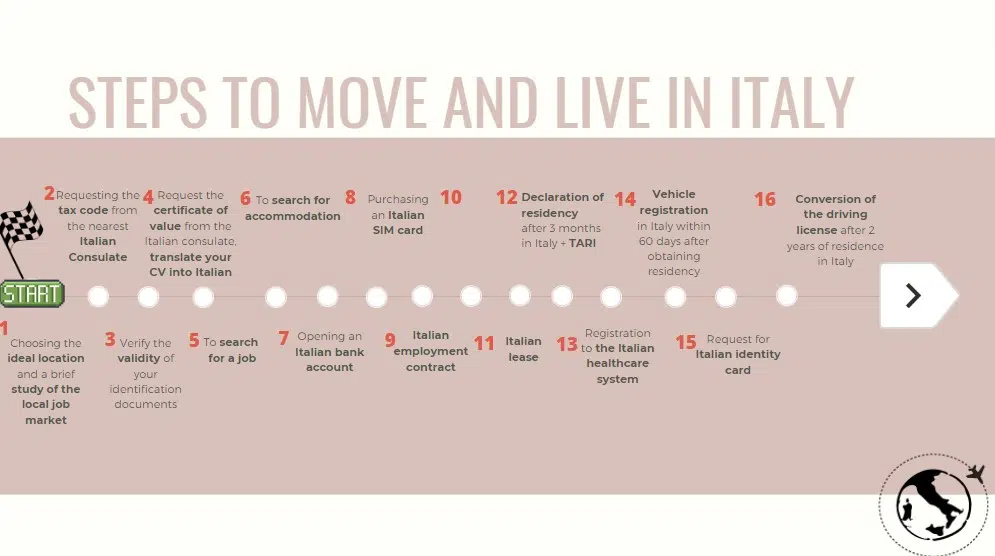Here are the 20 steps to expatriate to Italy that can help you prepare for your relocation to Italy. One of the biggest fears is getting lost in the complexities of Italian bureaucracy. You may encounter contradictory or incomplete information and feel unsure of where you stand. Don’t panic! In this article, we help you focus on the most important points.
Procedures for moving to live in Italy for EU citizens
You may be surprised, but the administrative procedures in Italy required for expatriation vary depending on your situation and the length of your stay in Italy. Let’s take the case of a typical situation where you decide to come and live in Italy, to stay and work there, in order to give you a guideline to follow
- Search for the ideal place: Each person/profile corresponds to an Italian region, sometimes you will be guided by the heart, sometimes by employment. It is essential to conduct market research in advance on places that could match your professional profile (by looking at job postings in the sector that interests you), but also by searching for the best area according to your personal needs (schools nearby, transportation, etc.) in order to facilitate your expat to Italy as much as possible.
- Request the italian tax code: You have probably heard a lot about it, the tax code is an essential element. It is necessary for you to request it from the nearest Italian consulate to your residence before your departure or at the “Agenzia delle Entrate” once you arrive in Italy. It is a personal identification number absolutely necessary for everything: looking for a job, opening a bank account, renting an apartment, getting a SIM card, buying a house, etc. The processing time is about 1 month, and the request is free but we advise you to request it as soon as possible to facilitate all other procedures.
- Check the validity of your identity documents: Before leaving, make sure your identity document is valid, because once you are there, you will have to go through the consulate to renew it and this could slow down all other procedures.
- Translate your diplomas into Italian: To request the equivalence of your diploma in Italy, it will be necessary to translate all your diplomas into Italian, doing it in advance will save you time.
- Request the “dichiarazione di valore”: The Italian consulate, at the beginning of your procedures, will be your friend for a while. You will need to request the certificate of value, which is a document that certifies the value of your diploma in Italy. This document will be sufficient as diploma equivalence in Italy if you hold an unregulated position such as (doctor, nurse, teacher, social worker). In case you hold a regulated position, it will be the competent Ministry to issue the equivalence and therefore it will not be necessary to request the certificate of value.
- Request the European Health Insurance Card: Once you are there, you may have a transition period. To be covered by the Italian healthcare service, you will need to have residency, and this may take some time, the European Health Insurance Card will be very useful to you until you are recognized as a resident in Italy.
- Search for a job in Italy: Don’t wait until you are there to look for a job, start responding to online job postings, contacting people on Linkedin, testing the market to get initial feedback and make your job search more effective over time
- Searching for accommodation in Italy: Renting an apartment in Italy is not simple, especially in big cities where demand exceeds available housing. Plan to spend a few weekends in Italy, arranging multiple visits in one day, preferably on Saturdays, to increase your chances and get familiar with your future environment.
- Opening a bank account in Italy: Initially, you can open an Italian bank account for non-residents, but once you are there, you can upgrade to a resident account for more favorable rates. Having an Italian bank account is essential for receiving an Italian salary and, in most cases, paying bills in Italy. Applying in advance will save you time.
- Buying a SIM card in Italy: You can live in Italy with a French SIM card, but check with your provider because some may block the SIM card if they notice you’re abroad for more than 6 months. Foreign plans can sometimes be more advantageous than in Italy, and this way they avoid competition.
- Getting a job contract in Italy: Finding a job in Italy is the first step to successful integration. Employment makes it easier to secure an apartment, Italian residency, and access to the Italian healthcare system, which is essential for staying in Italy.
- Obtaining a lease in your name in Italy: In Italy, you may be offered short-term rentals or leases without contracts to avoid the landlord paying taxes on the rent you pay. However, without a lease in your name or a letter of support, it will be difficult to apply for residency in Italy. The simplest way to obtain it is through an agency and inquire about the possibility of applying for residency for that accommodation.
- Subscribing to home insurance in Italy: Home insurance is not mandatory in Italy, but in case of damage, you may be held responsible under certain circumstances, concerning the landlord, neighbors, and the law.
- Applying for residency in Italy: After 3 months of continuous stay in Italy, whether you’re employed, unemployed, or a student, you must declare your residency in Italy at the registry office of your municipality.
- Registering for the Italian healthcare service: The Italian healthcare system becomes accessible once you have established residency in Italy. You can go to the nearest ASL (Local Health Authority) office to register and choose a general practitioner in Italy.
- Registering a foreign vehicle in Italy: You can drive in Italy with an european car for up to 60 days after declaring residency in Italy, beyond which you risk fines and vehicle immobilization. Trust me, a vehicle with foreign plates attracts attention quickly!
- Applying for an Italian identity card: After declaring residency in Italy, you have the right to request an Italian identity card, which includes all your information (tax code, Italian address) but is only valid in Italy. Nonetheless, it’s very practical!
- Applying for car insurance in Italy: You can insure your vehicle in Italy only after it is registered in Italy.
- Converting your foreign driver’s license in Italy: After two years of residency in Italy, you’ll need to exchange your foreign driver’s license for an Italian one. The points system in Italy is different, starting at 20 points and reaching a maximum of 30 points. This means you lose more points for infractions.
Now that you know the 20 steps to expatriate in Italy, are you ready to live in Italy?

